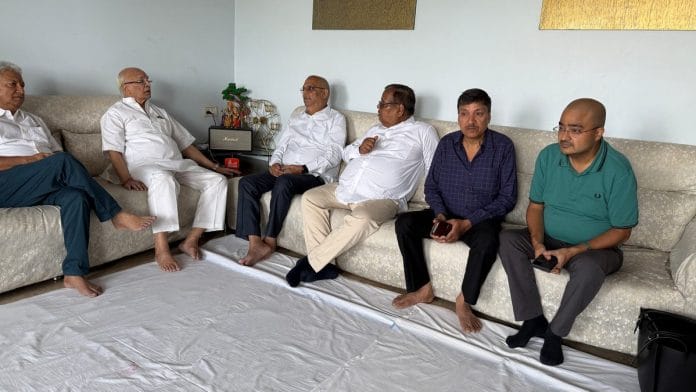Patna: As the family prepared for the tehravi of industrialist Gopal Khemka — shot dead outside his Patna home on 4 July — his brother Kishan said even police protection wouldn’t be enough. In 2018, Gopal’s son was also shot dead. Now, the family has decided to move the younger generation out of Bihar. Crime, he said, is only getting worse.
A steady stream of visitors, mostly fellow businessmen, filed into the Khemka home near Gandhi Maidan to offer condolences. Kishan sat still, exhausted but convinced that safety was now out of the question.
“We will not let the next generation suffer the same fate. We’re moving them out,” he said.
This growing sense of fear has gripped Patna’s business community. Many traders are hiring private guards, reopening old arms licence files, and calling for a “Yogi-style” crackdown on crime.
Khemka’s murder has become a flashpoint in the wider breakdown of law and order. That sense of lawlessness deepened when, barely a week after the 65-year-old industrialist was shot returning from Bankipore Club, BJP Kisan Morcha leader Surendra Kewat was gunned down by bike-borne assailants.
With Assembly elections just months away, it’s a moment of reckoning for the Nitish Kumar government. Not only has it failed to bring in big industries at the level promised, fears looms over the newly established ones, as businessmen are now being openly targeted. A fresh extortion network appears to be running rampant, reviving old memories of the 1990s. “Jungle raj,” once used to describe the RJD’s 15-year rule in Bihar, is back in the conversation. But this time, it’s being hurled at the JD(U)-BJP government and ‘Sushashan Babu’ Nitish — even as Prime Minister Narendra Modi continues to invoke it on the campaign trail to target the Opposition.

In the days following Khemka’s murder, three teams were formed — the Special Task Force, the CID, and the local police. Within four days, shooter Umesh Yadav was arrested. On 8 July, another accused, Vikas alias Raja, was killed in an encounter, and the alleged mastermind, iron trader Ashok Sao, was apprehended. Police say the motive was a land dispute.
But the family remains unconvinced.
“They called Lalu Prasad’s regime ‘Jungle Raj,’ but what we are living through today feels far worse,” said Shanker Khemka, a day after his brother’s murder. “Police stations are busy with extortion. The state itself seems to be enabling organised crime. Citizens are harassed while criminals slip through their fingers.”
For over a decade, the Bihar police have been busy conducting liquor raids, while more serious crimes continued to rise. In 2005, when Nitish Kumar first took office, Bihar recorded 1.04 lakh cognisable crimes. By 2020, that figure had more than doubled — to 2.5 lakh. As of May 2025, the state has already logged over 1.5 lakh cases, with half the year still to go.
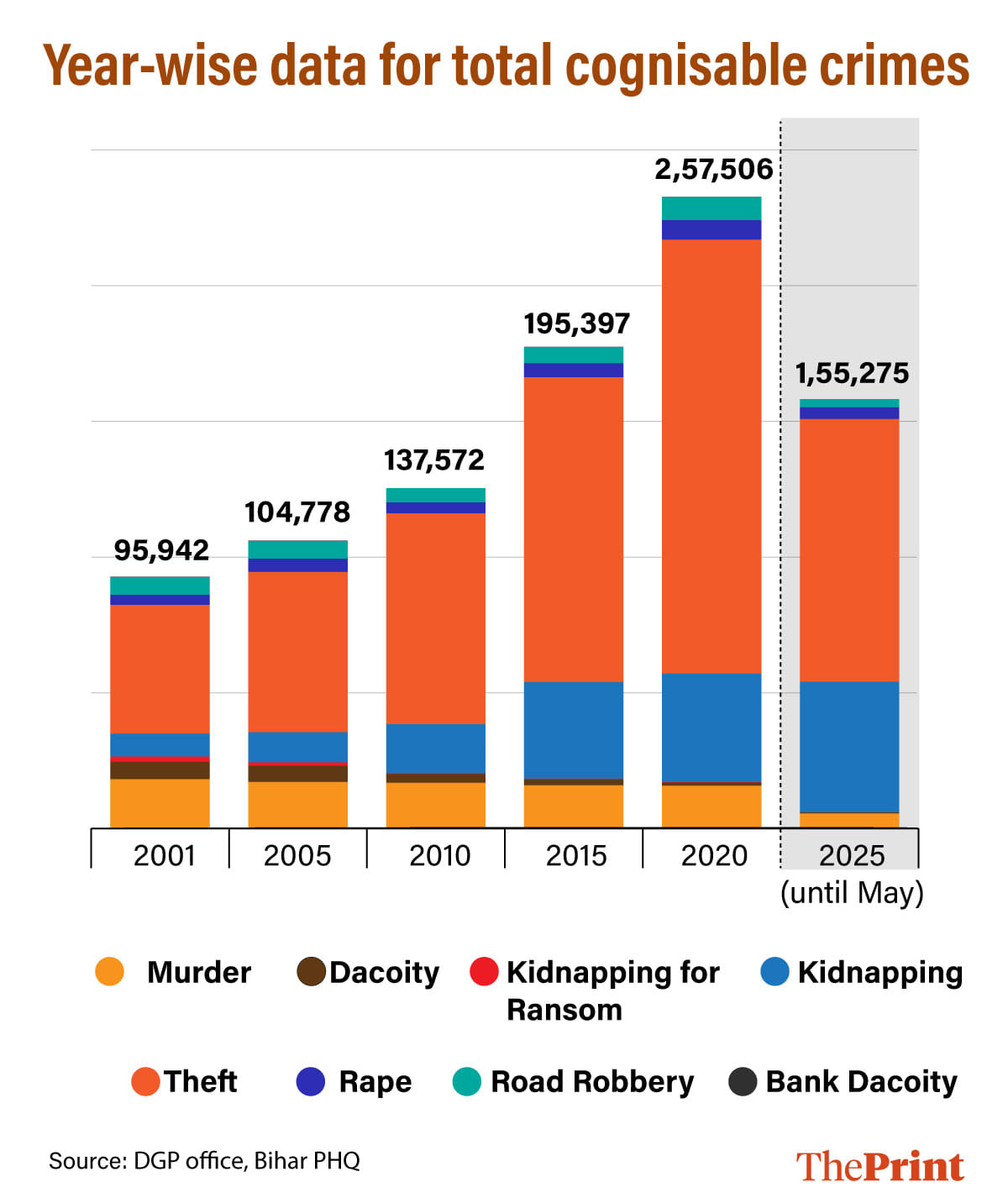
Kundan Krishnan, Additional Director General (Headquarters) of Bihar Police, said the increase in the crime rate is linked to the state’s social and economic pressures.
“Bihar has the highest fertility rate and one of the densest populations in the country. There’s also high unemployment, and so many young people turn to crime,” said the officer, who currently heads the Special Task Force in Bihar.
However, political experts and local residents say corruption is the root cause, with every level of the administrative machinery, including the police, affected.
Also Read: The story of Bihar’s two mafias—sand and booze
A wave of killings
The Khemka family has been part of Patna’s business landscape for 75 years. Patriarch Vishwanath Khemka came from Rajasthan after Independence, set up a paper business, and later helped establish Bihar’s first private multi-speciality hospital. He and his four sons survived the chaos of the 1990s “jungle raj”. But in the past seven years, that sense of stability has been shattered twice.
In December 2018, Vishwanath’s grandson Gunjan Khemka — Gopal’s son — was shot dead in broad daylight outside their factory in Hajipur’s industrial zone. The Nitish Kumar-led JD(U)-BJP government was in power then, as it is now. And now, history has repeated itself with the killing of Gopal Khemka.
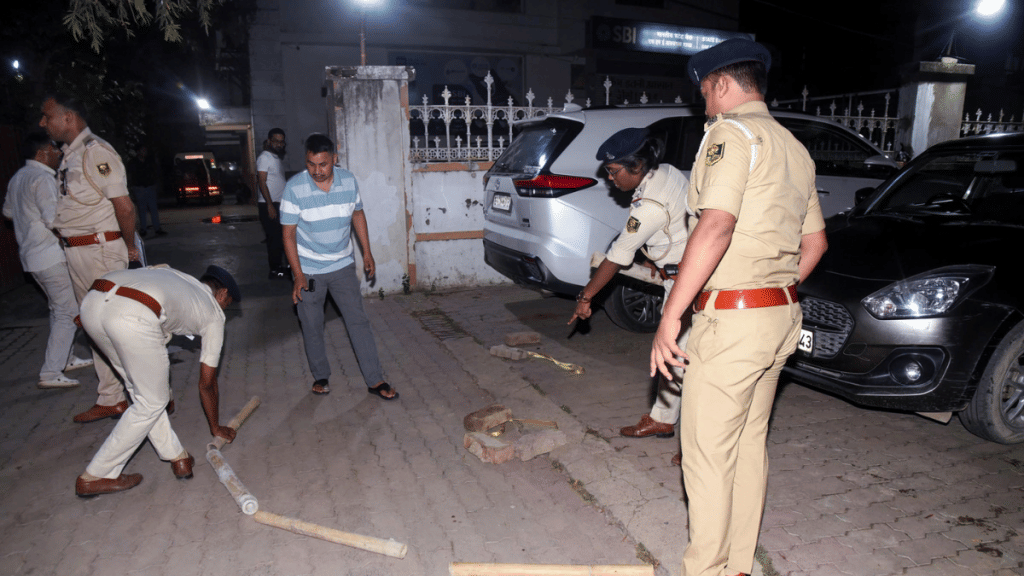
His death came amid a string of violent crimes that have rattled Bihar. On the same day, Siwan witnessed a spectacle of violence when over two dozen armed men attacked five people with swords and axes, killing three. One of the victims, Kanhaiya Singh, had written to the police just a couple of days earlier, warning that his life was in danger. Two days later, on 6 July, five members of a family, including three women, were beaten and then burnt alive by a mob of around 250 people in Purnia district over allegations of witchcraft. The following day, junior engineer Mohammad Mumtaz was stabbed to death inside his home in Muzaffarpur.
Neither wealth nor political connections seem to offer much protection. BJP’s Surendra Kewat was reportedly shot while working in his fields. On 27 May, businessman Amarendra Singh and his associate Shambhu Singh were gunned down while returning from their Godrej showroom in Chhapra. On 13 July, a day that saw four shootings within 24 hours, 58-year-old lawyer Jitendra Kumar Mahto was killed in Patna on his way back from a tea break.
The real crime being committed every second in Bihar is corruption and bribery. From bus conductors and clerks to SHOs and senior officials, the rot runs deep. Everyone is complicit. The perception of good governance has been punctured from within
Abhayanand, retired IPS officer and former Bihar DGP
The wave of killings, whether in Patna’s posh neighbourhoods or in small towns, has put Bihar’s promise of law and order under sharp scrutiny.
“If the crumbling law and order and rampant corruption in Bihar aren’t making anyone angry in the state, then we must say that the person’s sense of justice and human compassion has died,” wrote Tejashwi Yadav, Leader of the Opposition in Bihar Assembly, on X.
Congress leader Vikrant Bhuria told reporters on Monday that nobody is safe in Bihar now. Detailing how the mob targeted the family in Purnia, he said, “They were beaten first. Their hands and feet were broken. Then they were half-burnt, following which petrol and diesel was poured on them. Then they were charred to death. One victim tried to jump into a nearby waterbody to save himself. However, he was dragged back using a fishing rod and then again set on fire.”
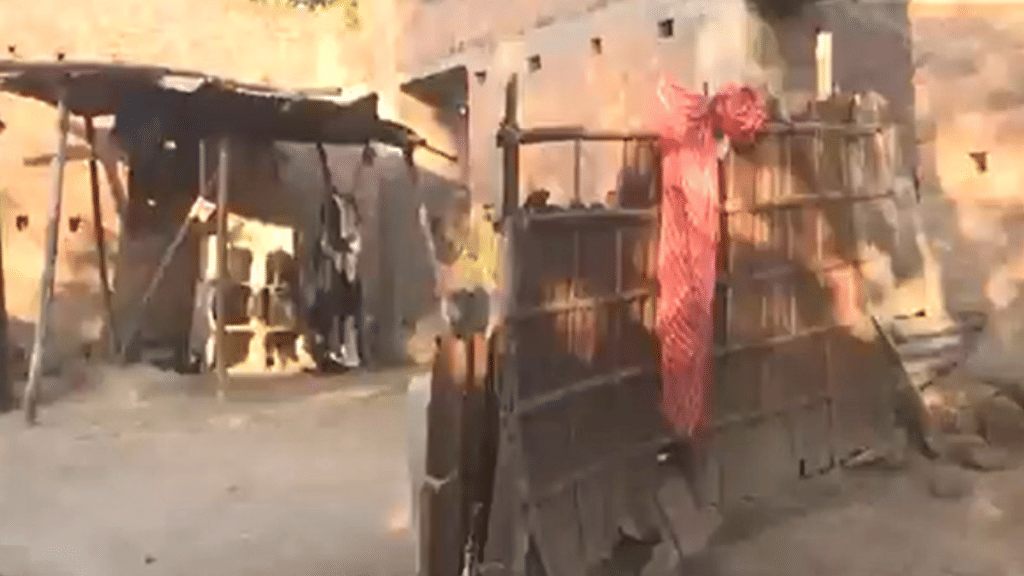
He added that the Congress delegation that visited the village found liquor bottles lying near the crime scene. “They were all under the influence of alcohol. Liquor ban is a ‘myth’ in Bihar.”
DGP Vinay Kumar, who took charge in December 2024, has offered a rebuttal to rising public anxiety. He insisted that the growing crime numbers aren’t signs of collapse.
“The increase in total cognisable crimes doesn’t necessarily indicate lawlessness. It suggests we have a functioning criminal justice system. We register cases instead of suppressing them,” he said.
But others disagree. Retired IPS officer Abhayanand, who served as DGP between 2011 and 2014, said systemic failure has emboldened criminals.
“The real crime being committed every second in Bihar is corruption and bribery,” he said. “From bus conductors and clerks to SHOs and senior officials, the rot runs deep. Everyone is complicit. The perception of good governance has been punctured from within.”
Eroding trust in police
Today, on Bihar’s streets, it’s not criminals that people fear most — it’s the hawk-eyed men in uniform. At chowks and traffic lights, policemen chase helmet violations; on highways, they frequently stop cars to check for liquor or missing papers. Residents say it’s harassment to make quick money.
“What should be a machinery of protection has begun to feel like a machinery of predation,” said Patna shopkeeper Sajjan Aggrawal. He claimed that when a business associate’s scooty was stolen, the SHO demanded a bribe just to file the complaint and start the insurance process.
“It’s pure loot at police stations,” he added.
Another Patna resident, driver Babloo Kumar, said the “nuisance” has crossed all limits. The Bihar police’s slogan ‘har waqt seva mein’ (always at service), he added, had morphed into ‘har waqt fera mein’ (always doing the rounds for bribes).
Earlier, even the local SHO carried enough reputation to make criminals hesitate to fire in the open. The perception of lawlessness goes beyond the triple murders or high-profile shootings
-Bihar IPS officer
There is the perception that the police will look the other way for the right price. Over the past three years, as many as 50 SHOs have been reportedly suspended or sent to police lines for taking bribes, including from sand and liquor mafias.
On 24 May, just a few hundred metres from the Secretariat and police headquarters, two men on a speeding motorcycle fired two rounds in the air, cutting through the market on one of Patna’s busiest roads — Boring Road. The firing was recorded on CCTV and the clip went viral.
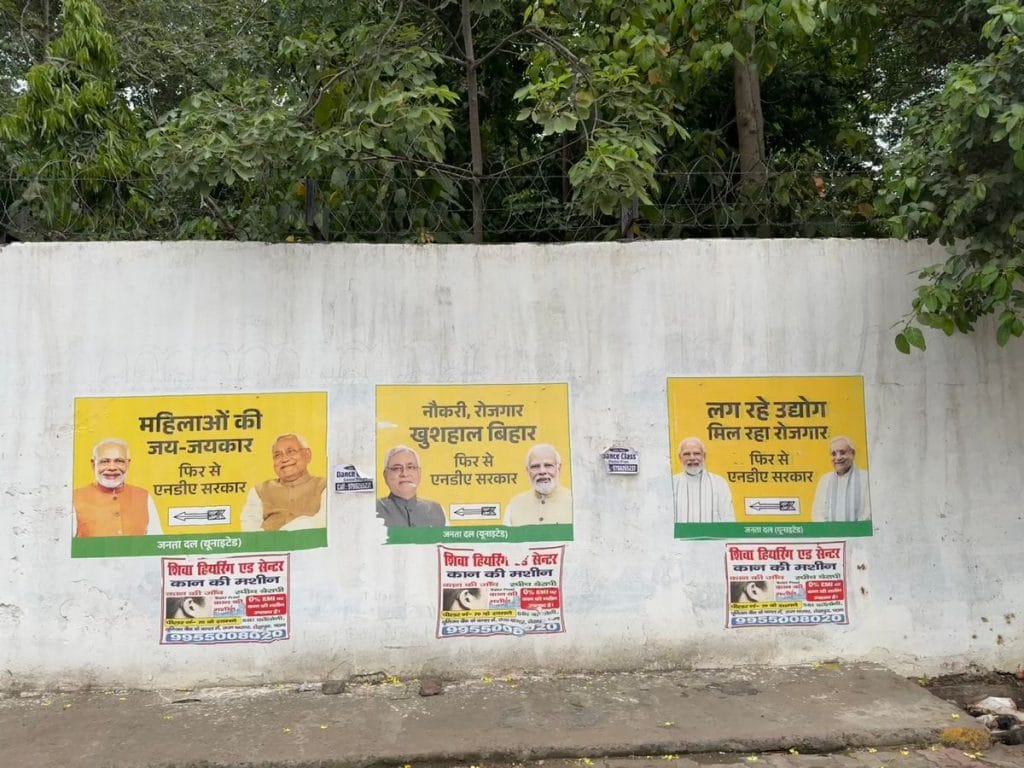
“The fact that they crossed two police stations and weren’t stopped shows that criminals have lost all fear of the police,” said a serving IPS officer, requesting anonymity. “Earlier, even the local SHO carried enough reputation to make criminals hesitate to fire in the open. The perception of lawlessness goes beyond the triple murders or high-profile shootings.”
However, senior police officials say they are now working to rejig the system.
Cleaning house
At Bihar police’s headquarters, there’s a new push to get things in order. On Saturday evening, when ThePrint visited the office of DGP Vinay Kumar, letters were going out to all 38 district SPs — commendations for some, rebukes for others.
“My priority is to maintain law and order and expedite trials,” Kumar said, adding that cases under the Arms Act were on top of the list.
Another senior police official admitted the need to reset the work culture.
“The system had become dheela and sust (loose and sluggish),” the officer admitted. “ADGs would leave headquarters as soon as the clock struck five.”
In the last five years, Bihar has gone through a churn in the upper echelons of police, with four DGPs — Gupteshwar Pandey (2019), Sanjeev Kumar Singhal (2020–22), RS Bhatti (2022), and Alok Raj (2024) — at the helm. Their tenures were shadowed by either murmurs of alleged corruption or administrative inaction.
Encounters aren’t the hallmark of a robust justice system. We don’t subscribe to that theory. We’ve used leg shots only about ten times. UP may have done it five hundred times
-Kundan Krishnan, ADG (Headquarters) of Bihar Police
Now, the Nitish government is banking on DGP Kumar and ADG Kundan Krishnan, who returned from central deputation in December 2024, to reverse the slide.
Under ADG Krishnan’s watch, the Munger belt has seen a crackdown on gangsters, with six encounters reported in the last six months. In a Muzaffarpur rape case last month, district authorities demolished the house and roadside eatery of the absconding accused to pressure him into surrendering.
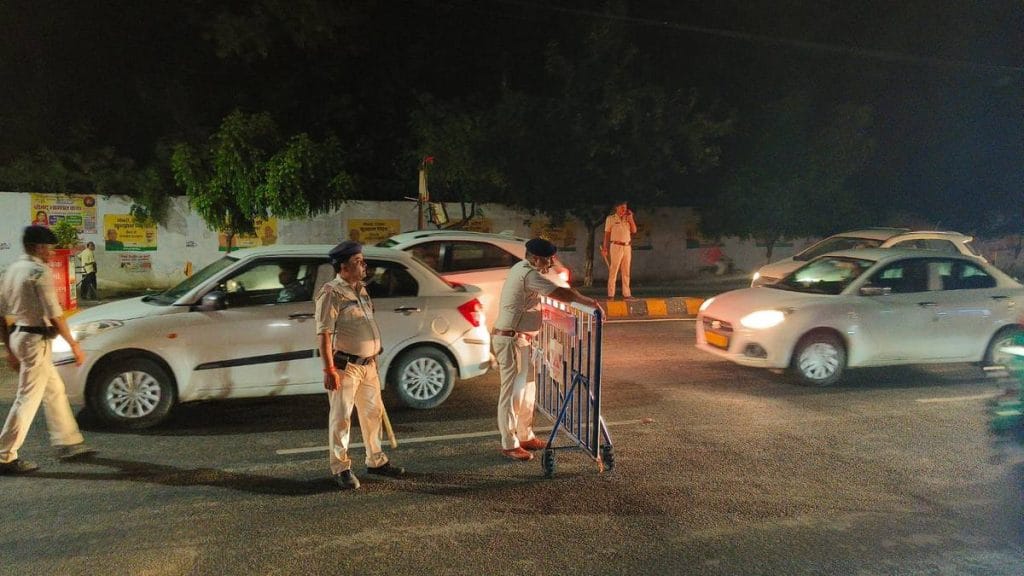
Krishnan, however, resists the parallels drawn with Uttar Pradesh’s policing model.
“Encounters aren’t the hallmark of a robust justice system,” he said. “We don’t subscribe to that theory. We’ve used leg shots only about ten times. UP may have done it five hundred times.”
Some retired officers look back to Nitish Kumar’s early years, when policing seemed to work and the “jungle raj” image began to fade.
Deepak Prakash, a retired officer from the 1994 batch of sub-inspectors, recalled how that cohort of 1,640 officers became central to Bihar’s policing transformation.
Hired during Lalu Prasad Yadav’s tenure and trained in Haryana, Punjab, and Jharkhand, they went on to form the backbone of early policing reforms under Nitish Kumar. Most served as SHOs during his first term (2005-2010), helping him build his now-fading image of sushasan (good governance).
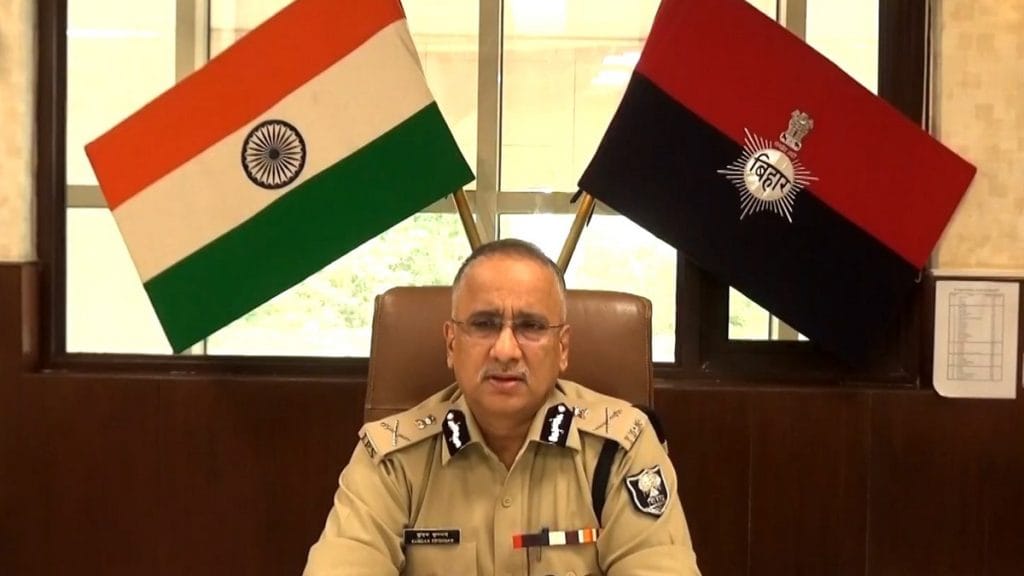
Over time, many of them rose to the ranks of inspectors and Deputy SPs. The next intake of sub-inspectors came only in 2009. Today, that batch leads nearly 99 per cent of police stations across Bihar, Prakash said. The state is currently recruiting constables for 19,838 posts.
The rank-and-file hasn’t changed much — only the leadership and the political environment have, according to Prakash, who later joined the STF.
“Murders aren’t always preventable but loot, gang wars, open firing, delayed chargesheets, or arrests, if that number has gone up, it is certainly the failure of the police,” he added.
You also shoot them (criminals) on the legs or bulldoze their houses
-Pradeep Pansari, Bihar businessman
One contributor to ‘failures’ over the last decade is a breakdown in internal discipline, according to some police officers. Suspensions or departmental inquiries no longer act as deterrents, and liquor prohibition has warped incentives.
“The fear of suspension is gone,” said a serving officer, “From sub-inspectors to DySPs, the liquor prohibition has helped them generate so much money that even inquiries against them can be managed, and at the end, most come out looking clean.”
Amid such allegations, DGP Kumar said that the Economic Offences Unit (EOU) is actively cracking down on corruption within the ranks.
“Just recently in Buxar, our team lodged an FIR against three trainee constables and one serving officer for accepting bribes to influence medical fitness clearances,” he said.
He also pointed to swift action in the Gopal Khemka murder case. Patna SSP Kartikeya Sharma, he said, not only arrested the shooter and conspirator within days, but also recovered the weapon, vehicle, clothes, and other forensic evidence.
“In the case of his son Gunjan Khemka, the court has held just one hearing in the last seven years,” he added. “We’ve submitted the chargesheet, and it is currently with the prosecution directorate.”
Also Read: Make women pregnant, get rich—Bihar’s cyber scam goes to a whole new level
Business community on edge
It’s not just the state of law and order that frustrates Bihar’s business community. They’re also worried about their ability to protect themselves. Dozens of arms licence applications remain pending with district magistrates across the state.
“You prioritise mukhiyas with political clout, not traders,” said a bitter Ashok Kumar Verma, state head of the Confederation of All India Traders. “Maintain law and order so we don’t need a licence, or let us defend ourselves.”
Last year, 60-year-old Verma, along with other representatives, had met former DGP Alok Raj to express growing concerns about traders’ safety. After the Khemka murder, the group also met current DGP Kumar, seeking reassurance and a speedy trial in the ongoing case.
“There’s real fear spreading through the business community,” Verma told ThePrint. “It began in Muzaffarpur, reached Chapra, and now Siwan. Jewellers, especially, are being picked off.”
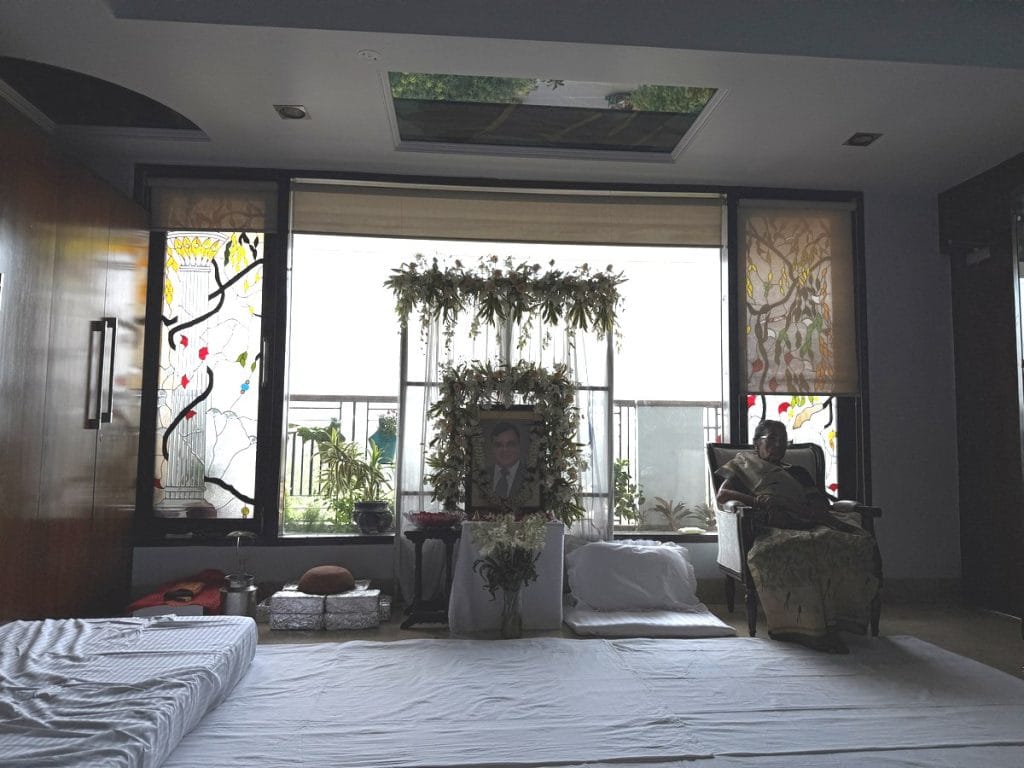
The tipping point came with Gopal Khemka’s assassination. His family has since been assigned three gunmen for protection, but Kishen Khemka said his arms licence application has been pending for six years.
The family has avoided both media and politicians since the murder, waiting silently as police interrogate the shooter and alleged conspirator.
“We want closure. Why was he killed?” Kishen Khemka said.
As the family waits for answers, others in Bihar’s business circles are openly calling for encounter-style policing in line with Yogi Adityanath’s model from neighbouring Uttar Pradesh.
“You also shoot them on the legs or bulldoze their houses,” said Pradeep Pansari, a businessman who came to offer prayers at the Khemka residence.
The trading community held a one-day bandh in protest, although the Khemkas declined to join, citing public inconvenience. Separately, the RJD called for a nationwide bandh, citing the breakdown of law and order as a central reason.
“What message is the state sending?” Verma asked again. “Are we here only to pay taxes or make donations for election campaigns?”
(Edited by Asavari Singh)



